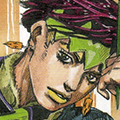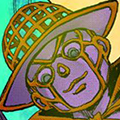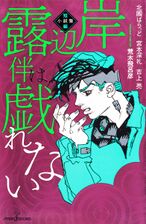Gleanings of Paradise
Gleanings of Paradise was included in a collection named Rohan Kishibe Does Not Frolic with three other stories, which released for sale on July 19, 2018. Gleanings of Paradise is on pages 195-264 in the volume.
Synopsis
Rohan is asked to work by a culinary magazine publisher and visits a recently opened casual French restaurant in Morioh to hear their presentation. The editor of the magazine, Toshiya Utsurogi (
Utsurogi then tells Rohan about the Gleanings of Paradise, which is said to be a legendary variety of wheat that can change the composition of the person who eats it. Utsurogi believes it could cure his daughter's allergy of wheat. His best friend from university, Shozo Yaginuma (
Summary
Chapter 1
Rohan is at a new popular French restaurant that opened in Morioh to have lunch with an editor of a culinary magazine named Toshiya Utsurogi. Utsurogi eats three rolls of bread before the main course, but Rohan restrains himself from having more than one. He asks Utsurogi who the child with him is, who Rohan notices is a thin, young girl who seemed to be only five years old. Utsurogi introduces her as his daughter, Yo. Utsurogi has been raising her alone since he got divorced, but promises that she'll stay calm while they discuss work. Rohan observes how Utsurogi would thoroughly inspect the meals that arrived before giving some to his daughter. Rohan reminds Utsurogi to explain about the job offer. Utsurogi then requests Rohan to draw a cooking manga for his magazine, but Rohan retorts that his art style isn't suited for that genre. Utsurogi claims that Rohan has the powerful ability to communicate the appeal of things he features in his manga, since after he featured an overseas brand in his work, the sales of their bags skyrocketed. However, Rohan believes that a cooking manga would be too generic nowadays since the genre is oversaturated.
Utsurogi then reveals his trump card: the Gleanings of Paradise, a rare species of wheat considered legendary in the food industry. The village producing it said they would agree to answer any questions Rohan has for them. Rohan thinks it sounds like a scam and is about to refuse the offer, but then the meat dish of the main course arrives. He decides to finish eating the meal and pay for the lunch before leaving. However, Rohan notices Yo only taking one bite of the meat, making an expression as if her food was poisoned, and then giving the rest of her plate to her father. Rohan complains about her attitude and manners, but Utsurogi apologizes and divulges that his daughter is allergic to wheat so she must be careful since most food contains it in some way. Rohan feels a bit embarrassed about his reaction and silently finishes his meal. Utsurogi then explains how the leader of the village cultivating the Gleanings of Paradise is his best friend from university. He used to work at a company conducting research on genetically modified crops, but suddenly gave up his career one day and then started to pioneer a village deep in the mountains. This bizarre behavior evokes Rohan's interest, making him wonder why the Gleanings of Paradise would make someone do such a thing. Moreover, Rohan asks why Utsurogi's friend would also invite Yo to try eating the Gleanings of Paradise at the village with them when she isn't able to eat wheat.
Utsurogi secretly discloses how the Gleanings of Paradise have the ability to dramatically change the constitution of those who eat it. Apparently, his friend claimed that it could also cure Yo's wheat allergy. Rohan thinks wheat that can cure an allergy to wheat is paradoxical, so he decides to join Utsurogi and Yo for research.[2]
Chapter 2
Rohan, Utsurogi, and Yo trek for almost half a day to reach the village, located on the rocky summit of a mountain in the Kanto region. The place is not considered habitable for humans, as the climate was cool and dry, with very little annual rainfall. The land was also largely untouched until it was cleared for cultivating the Gleanings of Paradise, and there were no roads or vehicles. The overweight Utsurogi had difficulty walking so far, so they had to take several breaks. He even ate most of their food supplies himself, so they were running out. Finally, they reach the village as night approached, but Rohan is suddenly enveloped by a bright light from the wheat fields. Mesmerized by the wheat's shining beauty like a sea of gold, Rohan takes several photos on his camera.
The village chief approaches Rohan from behind, happy to hear his excitement as he claims that the wheat is basically God in his village. Utsurogi catches up to Rohan and hugs his friend, as the two are happy to see each other again after a long time. The man then shakes Rohan's hand, introducing himself as Shozo Yaginuma. The group head into the village, which Rohan notices is eerily quiet. There are only about ten unlit houses and no stables nearby. Moreover, the pebble-covered ground did not seem suitable for growing wheat. Yaginuma explains about the Marginal Zone theory; it proposes that agriculture originated from people living in lands where the supply of food available for hunting was unstable. The Gleanings of Paradise is an ancient variety of wheat from those times, where it naturally grew in cold weather conditions that would usually render growth impossible. He further explains how there are about thirty people and livestock combined residing in the village. They don't use electricity, gas, or water, since the creed of their village is to live the same way as people did when the ancient wheat was alive. The villagers didn't even use any machinery to cultivate the fields, instead doing everything by hand. Rohan is shocked at their devotion.
Yaginuma passionately describes how the symbiotic relationship between wheat and humans dates back to the Agricultural Revolution, emphasizing that wheat's encounter with humanity was just as fateful for its own reproduction. Yaginuma presents two different ears of wheat, highlighting the differences between the ancient Gleanings of Paradise and modern varieties of wheat. He believes that this ancient wheat, which he revived through genetic engineering, will eventually be cultivated by all of humanity.
Rohan asks Yaginuma if the Gleanings of Paradise really do change one's constitution once they eat it, to which Yaginuma confirms that it does. Utsurogi points out how Yaginuma used to be a beautiful, skinny boy who looked like a stereotypical scholar, but now looks like a completely different macho man. Yaginuma reveals that the changes depend entirely on the person who eats it. As they walk through the village, Rohan observes villagers manually grinding the wheat, wholly engrossed in their task and ignoring their guests. Yaginuma describes the process as a ritualistic act of accepting God. He offers Rohan a taste of the freshly ground Gleanings of Paradise, which Rohan and Utsurogi naturally accept.[3]
Chapter 3
Chapter 4
Chapter 5
Chapter 6
Chapter 7
Chapter 8
Appearances
Gallery
References
- ↑ Compilation Release
- ↑ Gleanings of Paradise Chapter 1
- ↑ Gleanings of Paradise Chapter 2






